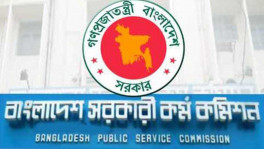Why setting a floor on deposit rates could put banks in a tight spot
While the central bank’s fixing of the interest paid to depositors may benefit the depositors, it introduces a wide range of challenges for the banks struggling with risky loans due to the fallout of the Covid-19 pandemic

Bangladesh Bank has recently issued a circular setting the floor on the interest rate of term deposits lasting three months and longer to the three months' average inflation rate in a bid to protect the depositors from losing their purchasing capacity.
In the circular titled, 'BRPD#17', the central bank observed that most banks are offering interest to the depositors at a rate less than the inflation rate which affects depositors' purchasing power and compels them to divert their money to unproductive or risky sectors instead. However, the lending rates on investment/loans will remain unchanged at the highest 9 percent
To put the situation in context, the banks lowered the deposit rate to adjust their funding costs in the backdrop of the imposition of 9 and 6 percent lending and deposit rate respectively by the central bank. The aforementioned circular, however, will ensure that the depositors' money is adjusted to inflation and encourage the borrowers to get a loan at a fixed rate.
On the other hand, this development may come with its own set of challenges for the banks.
Firstly, the asset value of the banks may decrease. Let us use an example, for a loan of Tk100, Tk109 will be paid back by the borrower at a 9 percent interest set by the banks.

If we adjust the total money received by the banks to the latest available rate of inflation (2020) of 5.7 percent, the total money received by the bank is worth Tk103.3 in real terms (At the real rate of interest of 3.3%).
Simultaneously, the banks must keep a provision of around one taka for every Tk100 invested in every sector other than the CMSME sector and unclassified loans. As a result, the value of the money received by the bank is now worth Tk102.3 after adjusting for the provisions it must keep.
In this example, we are not even considering the higher provisions necessary for classified and non-performing loans as well the operating costs of the banks which would further erode the asset value. The situation is further worsened by the Covid-19 pandemic limiting the ability of businesses to repay their loans on time due to a fall in revenues and the prominence of classified loans in Bangladesh in general.
Moreover, the deposit rates in the country may wax in the days ahead anyway as the central bank has recently decided to mop up excess liquidity which may compel banks and NBFIs to offer higher rates. Noticeably, some NBFIs are offering 9 percent and above on the deposit rates.
Consequently, the changes ushered in by the central bank may negatively affect the banks in two ways: by creating a shortage of liquidity available to the banks and reducing the asset value of the banks significantly. Inevitably, banks may be forced to offer even lower interest rates on the depositors' savings in the future to not raise the cost of funding or risk lowering its efficiency.
Finally, banks may be put in a very difficult situation in the presence of fixed loans and deposit rates to handle the rising costs of funding and the management of widespread risky loans during the Covid-19 pandemic.
Abu Sayed Md Abdul Mannaf is the Vice-President and the Head of Khulna Zone at ONE Bank Ltd.
Disclaimer: The views and opinions expressed in this article are those of the authors and do not necessarily reflect the opinions and views of The Business Standard.



 Keep updated, follow The Business Standard's Google news channel
Keep updated, follow The Business Standard's Google news channel
















